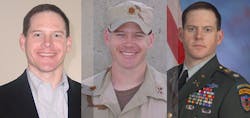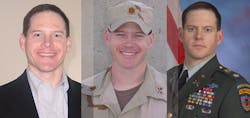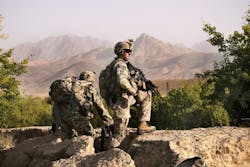It goes without saying that pounding the ground under fire, rifle at the ready, is far more dangerous than driving a truck for a living.
Yet there are parallels – especially when it comes to fighting fatigue.
For when soldiers in combat or truck drivers piloting big rigs at highway speeds make mistakes, the consequences can be disastrous.That’s why the need to be rested and alert is critical the safety of soldiers on the battlefield and commercial vehicle operators alike.
I talked about that very issue not long ago with Chad Storlie (at left), a retired U.S. Army Reserve Special Forces officer and author of Combat to Corporate: Applying Military Spec Ops Principles to Business Success.
He explained to me that many standard operating procedures (SOPs) used by the military can be applied to the civilian business environment (indeed, that’s what his book is all about) particularly where transportation is concerned.
Storlie stressed to me that, when it comes to fighting fatigue, ensuring that civilian workers and soldiers alike get proper rest and sleep doesn’t occur in a vacuum – it requires focused and continued leadership to make both ingrained routines.“In combat operations, I made sure that I would go and take naps when the opportunity presented itself,” Storlie said. “As the leader, you have to set the example; you have to practice what you preach.”
He added that the military approach to sleep mirrors its approach to proper hydration: If you become thirsty, then you are already dehydrated.
Thus, Storlie noted, the best approach is to continually drink water throughout the day to prevent becoming dehydrated in the first place.
That’s why napping is so critical to sustaining the effectiveness of soldiers in the field, he emphasized – especially in light of the irregular nature of combat operations.
Storlie offered me several other tips gleaned during his military career – which included battlefield experience in Iraq – that truck drivers and fleets alike might consider as both search for ways to improve the ability rest and sleep while on the road:
- Have a Schedule: As much as possible, military units train to a precise schedule where all critical activities such as maintenance, physical fitness, food, and rest are accounted for.
- Prioritize Work: “Priorities of Work” is a critical planning tool in the military, he says, designed to ensure that the most mission-critical items are done in the proper order with enough time allocated for proper completion. For military units, typical priorities in order are: security, planning, maintenance, rest and food.
- Mandatory Crew Rest: Any military unit that provides transportation of freight, supplies or personnel imposes mandatory amounts of “crew rest” to ensure safety, Storlie noted.
- Fatigue = Poor Performance: One maxim always drummed into Storlie in the military is that a tired mind not only equals poor performance but creates the potential for a “safety violation” as well. “Military units often train to high levels of personnel fatigue and one of the major reasons for this is to get people to understand that they make very bad decisions while fatigued,” he explained. “This understanding – that fatigue equals poor performance – re-emphasizes to military personnel at all levels the importance of getting sufficient rest.”
- Anticipating Fatigue with SOPs: Military units realize they become fatigued and thus plan elaborate SOPs to ensure that measures and countermeasures are in place to support safety and mission effectiveness. Part of that includes encouraging the lower ranks to speak up when they notice fatigue, Storlie pointed out; no matter who is suffering from it. “One of my sergeants once took me aside in the field and told me, ‘Sir you are really tired right now and making some bad decisions; you need to go lay down.’ And you know what? That’s exactly what I did,” he said.
- Wellness Combats Fatigue: The military uses physical fitness, simple food high in protein and low in carbohydrates, high levels of hydration, and a reinforcement of no tobacco use to ensure high levels of peak physical performance, Storlie stressed. All of those measures help reduce fatigue and improve the ability to get restorative sleep, he added.
It’s not rocket science, following tips like those above to help truck drivers attain better rest and sleep out on the asphalt. But they certainly require continual focus to be successful.


